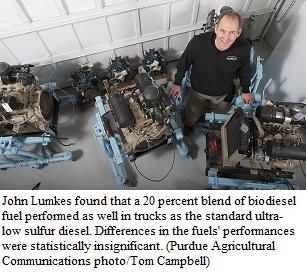A 20 percent blend of biodiesel runs just as good as No. 2 ultra-low sulfur diesel. That’s the findings of a new study from Purdue University that showed no statistical dropoff when semis run the green fuel:
 “In terms of performance, reliability and maintenance costs, it was basically a wash,” said John Lumkes, the assistant professor of agricultural and biological engineering who led the study. “The only differences are environmental and economic.”
“In terms of performance, reliability and maintenance costs, it was basically a wash,” said John Lumkes, the assistant professor of agricultural and biological engineering who led the study. “The only differences are environmental and economic.”
The study, which compared two 10-vehicle truck fleets using the ultra-low sulfur fuel and B20, was released in the journal Applied Engineering in Agriculture. Trucks used for comparisons in the yearlong study had the same engines, similar miles already on them at the start and drove nearly the same number of miles over the year.
The only statistical difference related to the B20 was that it lowered the oil viscosity between maintenance intervals in engines slightly more than the ultra-low sulfur diesel. But even so, Lumkes said the oil still had sufficient viscosity so as not to damage engine parts.
“They were still within the range of what is acceptable before you need an oil change,” he said.
Lumkes and his researchers ran 10 trucks more than 1.5 million miles and found no appreciable difference in fuel economy, fuel test results, engine oil analysis, and service and maintenance costs. The only difference was that the B20 costs about 13 cents more per gallon than the ultra-low sulfur diesel. But Lumkes says the the real value of the test shows that engine manufacturers don’t have to worry that biodiesel will cause abnormal engine wear.

